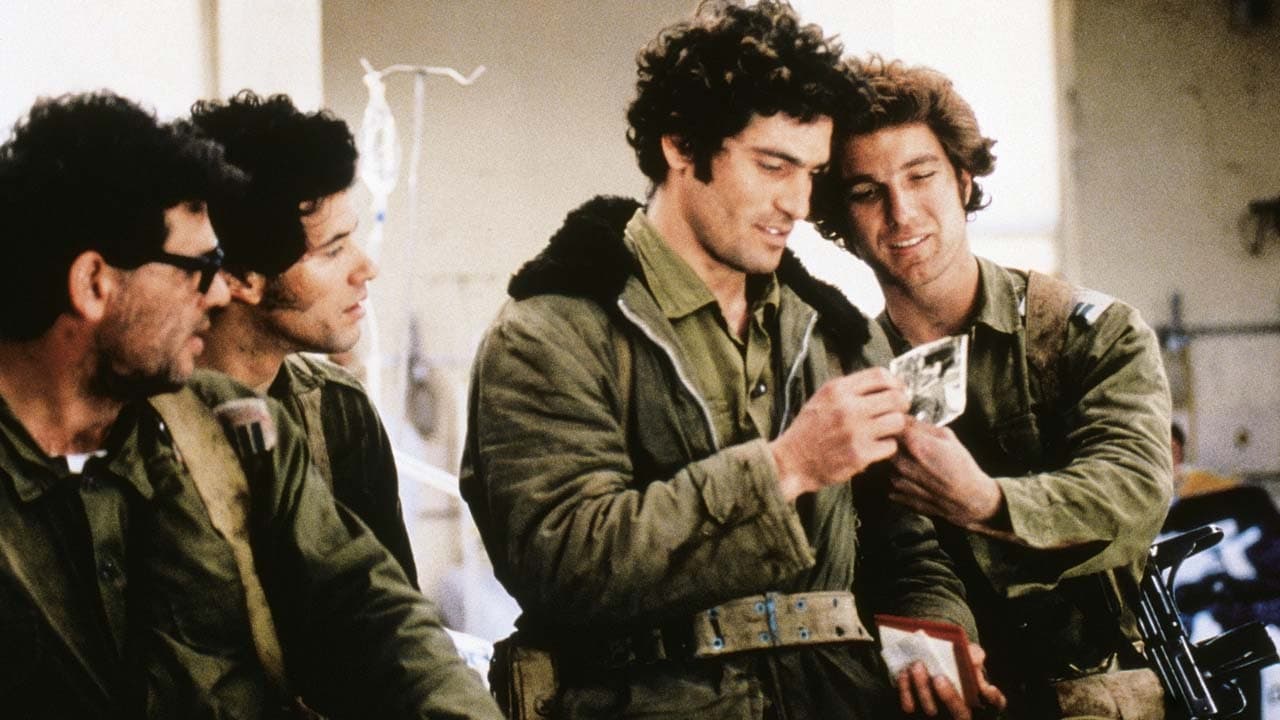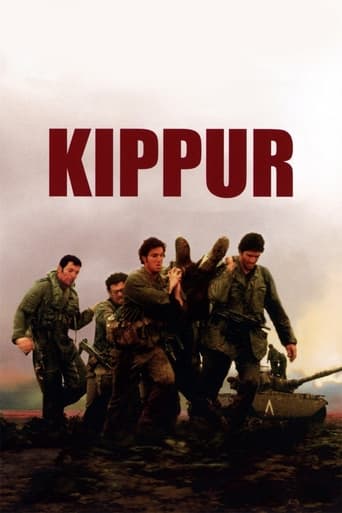

The Yom Kippur war almost caught Israel unawares. Twenty days later they were across the Suez 100km from Cairo and near as many from Damascus, another disaster for the Arabs. In a strange turn of events however, the surprise attack and doom-laden buildup to it, with thousands of graves dug in anticipation, had a devastating effect on the country, in effect signaling a perpetual state of fear and alert.I am in the middle of exploring through films these bumps in the national mind, which brought me here. For what it's worth, the filmmaker has decided to capture an experience of war as purely about what it means to be there as he can. He knows, he was there.Sadly, it's flat beyond belief. For better or worse I found it to be nothing like Thin Red Line, as others have mentioned in their comments. Whereas Malick spins war to be one of conflicting urges in the soul, this is what we see, two hours of med- evacs carrying the wounded.There's one contemplative image in the film, a helo shot of a muddy battlefield with maneuvering tanks drawing meaningless patterns on the mud, contrasted with the early shot of the lush mingling of painted sex evocative of life, color, imagination, spontaneity. It's a great shot, and perfectly describes both what the film wants to portray, a sort of aimless cosmos, and what it ends up with—aimless doodling on the ground.So the filmmaker reminisces in film about a time and place that allowed no skyward gaze. The important message is that war is as wasteful and pointless to happen in real life as it is to watch in this film.
... View MoreA docudrama about two young Israeli men who help evacuate the wounded from the battlefield and at the end are themselves hurt when their helicopter is downed.That's about it for the plot.The film is aesthetically ambitious though. It thrives on its imagery. I haven't seen so many looooong and static shots since Hitchcock's experiments in the late 1940s. Even Ozu would be weirded out by these exhausting scenes during which, for most of the time, nothing much is happening. Men shout over the noise of the battlefield and slog through the mud from one place to another place that's ten feet away. Even after the credits, when we see a man and woman rolling around and having sex on a bed splashed with paints of different colors, the scene goes on and on and on while a saxophone ululates a little mournfully behind them. It's no more erotic than the shifting textures of the loving couple in "Hiroshima, mon Amour." A bit of the background of the two men is sketched in, but not much, so we can't really identify with them. The only other soldier I was able to distinguish was the doctor, and that was because he looked like Francis Ford Coppola.There are absolutely no clichés to be found. They're fighting the Syrians but we never see any, and the enemy is mentioned only once or twice, and then matter-of-factly, not with bitterness or hatred. There is virtually no banter between the men, the kind that we've become so used to. No jokes. No mail call. Just a winter landscape that is foggy, cold, muddy, and altogether inhospitable. Most of us, when we think of Israel, that lonesome Western outlier, think of it as it is during the tourist season, all sunshine and golden grass. But in winter, Mediterranean climates can be as miserable as anywhere else, as any good Californian can tell you.Speaking of the Mediterranean -- and I'm glad you brought it up -- the film gives us a fairly clear picture of citizens in the Circum-Mediterranean cultural region at war. Here are these Jews running around, shouting and waving their hands and arguing, while the helicopters put-put-put ear-splittingly next to them and the tanks rumble past like diesel trucks. (On the other side, the Syrians are undoubtedly doing the same.) This is 1967 and the men are sloppy and long-haired, and they're good warriors all. What would General Patton with his spit-and-polish have made of this? Most impressive scene. The two men arrive late at a briefing before going to the front. The officer in charge is a bit irritated and asks one of them what he can contribute to the effort now underway. The man gets to his feet, looking a little shy, and says weakly, "Well, we've been trained for this duty. If we have a pilot and another man we will do the job perfectly." Something like that. His demeanor is completely at odds with his confident reply.It's by no means an uninteresting movie. It's just that the director and the editor overreached themselves and have slowed the tempo down to a funereal pace. There were times when I found myself hoping that the mail call cliché would take place so the men could read letters from their sweethearts back home and joke with one another.
... View MoreAs an Israeli's view of war, "Kippur" takes "Thin Red Line"s visual approach, with little plot or explication or context, from the sacred (Yom Kippur mis en scene) to the procreative beginning, to the wounds and exhausted faces of the soldiers.This is a war where a soldier takes his used Fiat right up to the front and back again to his girlfriend's front door. Unlike "Tigerland" where the soldiers are young neophytes with taut basic training bodies, these are lean, lanky, long-haired chain-smoking, experienced reservists who pretty much pick and choose where they'll serve. Instead of the usual U.S. barking sergeant, this unit is based on long-term friendship, training, coordination, shared goals and consensus. Fodder for discussion on military management styles. And I can't think of another war movie where a guy named Weinraub is as sexy looking. Even my husband, who is a devotee of the War Channel and thought it was way too arty (and amazingly this was from the same director who did the agit-prop anti-Orthodox domestic drama "Kadosh") found one long sequence with almost no dialog very effective, as the medics try to rescue the wounded in the mud.The projectionist shut down the credits before it was finished.(originally written 12/2/2000)
... View MoreThis film offers more of an artistic view of warfare on a level that one normally does not see; even though the dialog in the film is small, and even though what dialog there is does not focus on the main, overriding theme of the vile nature of war the point is still clearly conveyed by the director's use of his actors and the camera. Overall, the film could have been much shorter; it was seemingly dragged out at times, and sometimes it seemed downright tiring to watch. However, some of the shots throughout the film were very good, and the story at times can be interesting. But when all is said and done, this is not a very high quality film due to its' unnecessary length and often overly artistic portrayal. The few moments of good cinema in here do not make the whole thing worth watching.
... View More